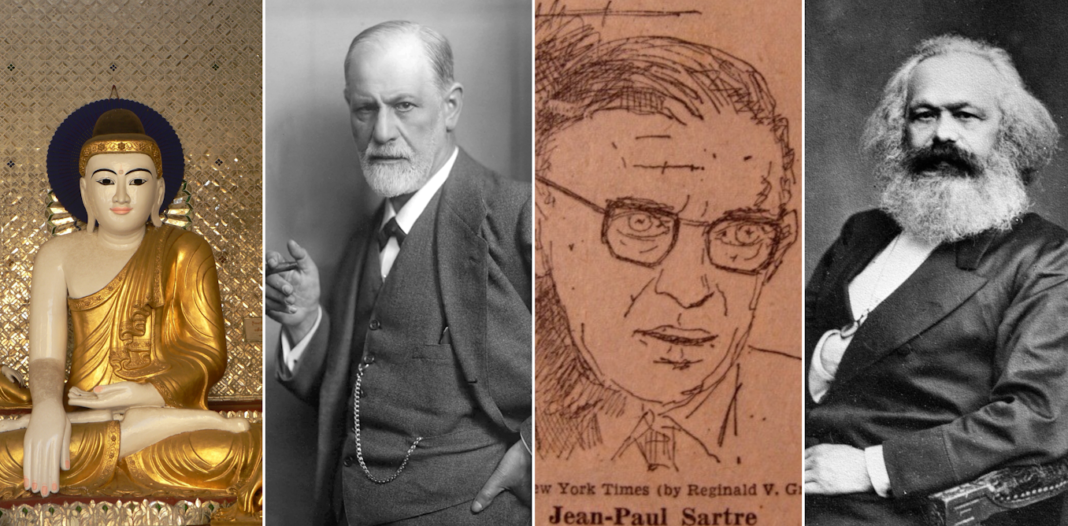Anxiety, a Philosophical Guide
Author Samir Chopra’s aim is to take us through the history of philosophy, pointing out those thinkers along the way who have shaped its course.
Confronting Anxiety
Rather than explain our anxiety away, Chopra’s aim here is to cultivate the ability to see what anxiety “points to”. In this short text, he explores four schools of thought in relation to anxiety: Buddhism, existentialism, psychoanalysis, and critical theory.
Buddhism
Chopra writes openly about his struggle to cope with the loss of his father at a young age, and later, the loss of his mother. In seeking relief from grief, an unyielding melancholy, and his anxiety about death, he turns to philosophy. This book is very much a product of Chopra’s life experience and how he came to accept and live with his anxiety with the help of philosophy.
He begins by exploring how anxiety – and other emotions traditionally treated as aversive such as anger – can be overcome by an awareness of our “true nature”. These emotions surface in the Buddhist conception of “dukkha”, which Chopra defines as
an acute anxiety, an existential discomfort, resulting from an intellectual and emotional failure to face up to the bare facts of existence.
In order to live tranquil lives in the face of our experience of dukkha, we must embark on the Buddhist journey of “coming to see”. This is a long, difficult process of transforming how we understand the world and our place within it.
Existential Anxiety
For the existentialists, as the name suggests, the root of our anxiety stems from our search for existential meaning.
The existentialists defined themselves in opposition to the essentialists, who argued there was a “telos” (an end, or purpose) to everything, including our own lives. Instead, the existentialists assert, there is no meaning or purpose in life at all.
In Sartre’s famous lecture, Existentialism as a Humanism, he writes,
We are left alone, without excuse. That is what I mean when I say that man is condemned to be free. Condemned, because he did not create himself, yet is nevertheless at liberty, and from the moment that he is thrown into this world he is responsible for everything he does.
Human life is marked by a nauseating abundance of freedom, which we are condemned to do something with. Chopra writes, “we are not just creatures who are free to act; we are creatures who are aware we are free to act”.
Psychoanalysis and Critical Theory
Chopra’s brief detour through the psychoanalytic tradition brings us to Sigmund Freud. The latter, he maintains, would double down on this existentialist call for courage, with the added proviso that attempting to repress anxiety is futile.
Repressed anxiety only comes to surface in parts of our lives, particularly our social lives. Freud suggests a trained and mature response to anxiety involves better understanding how it forms part of life, how it arises in our childhood, and how it surfaces for us now.
Conclusion
Overall, Chopra does a great job bringing difficult philosophical perspectives into his conversation about anxiety. However, anxiety appears to have many roles in this book, roles we might usually ascribe to other emotions or moods, like estrangement, wonder, alienation or sorrow.
By implicitly running together these many forms of experience, Chopra risks reading too much into these philosophers at times. A consequence of this is overlooking what makes these experiences unique.
Still, by sharing his own experience with anxiety, as well as connecting us to the extensive philosophical literature where anxiety is explored, Chopra and his philosophical interlocutors are offering a powerful and therapeutic insight: we are all bound together in the human condition that always has, and will continue to involve, encountering our anxious selves.
FAQs
Q: What is the main idea of the book “Anxiety, a Philosophical Guide”?
A: The book explores four schools of thought in relation to anxiety: Buddhism, existentialism, psychoanalysis, and critical theory.
Q: Who is the author of the book “Anxiety, a Philosophical Guide”?
A: The author is Samir Chopra.
Q: What is the purpose of the book “Anxiety, a Philosophical Guide”?
A: The purpose is to cultivate the ability to see what anxiety “points to” and to explore how anxiety can be overcome through philosophical perspectives.




